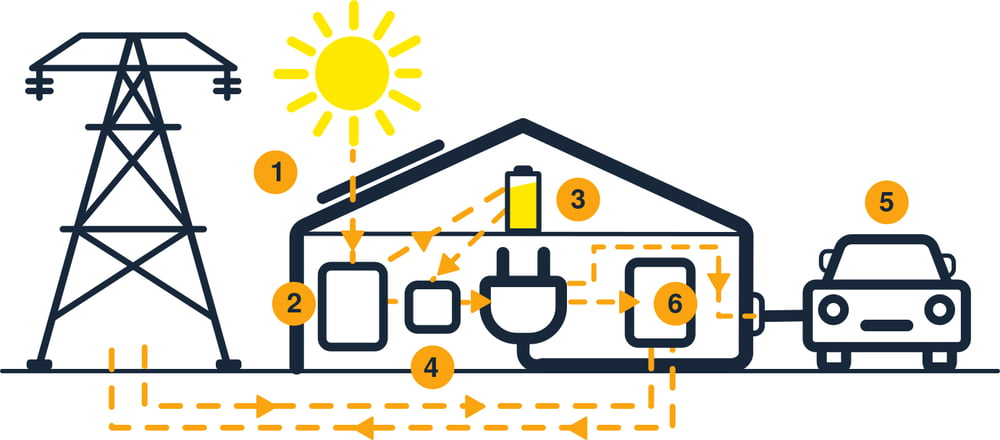Sun to Socket:
Solar EV Charging for a Sustainable Future
Save heavy on your power bills

A Future Fueled by Solar Powered EV Charging
THE PROMISE OF SOLAR EV- CHARGERS
As the world grapples with the urgent need to combat climate change, the intersection of solar energy and electric vehicles (EVs) offers a compelling solution: solar EV chargers.
These innovative devices integrate the power of the sun with electric mobility, creating a sustainable and efficient charging infrastructure that paves the way for a greener future.
Solar EV chargers combine two key elements: solar photovoltaic (PV) panels and electric vehicle charging stations. The PV panels capture sunlight and convert it into electricity, which is then used to charge EVs. By directly harnessing solar energy, these chargers eliminate the need for electricity from the grid, significantly reducing greenhouse gas emissions associated with charging EVs.
The advantages of solar EV chargers are multifaceted. First and foremost, they promote clean energy generation and reduce carbon emissions. As EVs become more prevalent on the roads, charging them with solar energy ensures a zero-emission charging process, leading to a substantial decrease in the overall carbon footprint of transportation.
Another notable benefit is energy independence. Solar EV chargers can be installed in remote areas or locations with limited access to the grid, allowing EV owners to charge their vehicles using clean energy sources independently. This resilience is particularly valuable during natural disasters or emergencies when conventional power infrastructure might be compromised.
Moreover, solar EV chargers offer a cost-effective charging solution over the long term. While the initial investment for installing solar panels and charging stations may be higher than traditional charging infrastructure, the ongoing operational costs are significantly reduced due to free solar energy. As solar technology advances and becomes more affordable, the overall cost of solar EV chargers is expected to decrease further.
Furthermore, solar EV chargers contribute to grid stability. By distributing energy generation across various charging stations, they alleviate the strain on the electrical grid, reducing the likelihood of blackouts during peak charging periods.
However, challenges remain for the widespread adoption of solar EV chargers. The efficiency and capacity of PV panels, energy storage solutions to handle periods of low sunlight, and optimizing the integration of solar charging with existing grid infrastructure are some of the areas that require further research and innovation.
In conclusion, solar EV chargers hold great promise in accelerating the transition to sustainable transportation. Combining the renewable energy potential of solar PV with the increasing popularity of electric vehicles, these chargers offer a pathway to reduce greenhouse gas emissions, promote energy independence, and create a more resilient and efficient charging infrastructure. As technology progresses and investments in renewable energy grow, solar EV chargers are set to revolutionize the way we charge our vehicles and drive toward a cleaner, greener future.

- Solar panels generate electricity from UV lighting even in all weather conditions.
- The Inverter changes the current from DC to AC, so that it can be used in your home.
- Any surplus energy that is not used will be stored in your home battery storage for later use.
- The Consumer Unit Board controls the distribution of solar energy.
- This green energy is then used to power your home or recharge your electric vehicle when needed.
- Your Generation Meter will calculate how much energy you have produced.
Save heavy on your power bills
We install world’s top solar brands
To give you the best solar experience











Save heavy on your power bills
Home and Commercial EV Charger Installations Across the UK
Solar4Good supplies and installs efficient EV charger solutions for residential and commercial use across the UK. Whether you’re charging your electric vehicle at home or setting up points for customers or staff, we tailor every installation to suit your power supply and usage patterns.
Our services include the setup of standalone and solar-integrated EV chargers, with a focus on safety, smart connectivity, and long-term savings. We work with homeowners, property developers, businesses, and public sites to enable future-ready electric vehicle infrastructure.
Benefits of Choosing Solar4Good Nationwide:
- Full-service installation of home and commercial EV chargers.
- Smart system design for solar-powered or grid-connected EV setups.
- Local engineers with experience across domestic and commercial EV installations
Power your electric journey with Solar4Good’s EV charging systems—installed across the UK.
Frequently Asked Questions
An EV charger uses energy generated by solar panels to charge your electric vehicle (EV). The solar panels convert sunlight into electricity, which is either used or stored in a battery for later use. This reduces reliance on the grid and lowers charging costs.
Yes, a solar-compatible EV charger can be installed at home, provided you have solar panels and a compatible electrical system. These chargers are designed to prioritize clean energy by using solar power first, and only drawing electricity from the grid if required. This ensures your EV is charged in the most sustainable and efficient way possible.
- Saves money by reducing electricity costs through the use of solar energy
- Lowers your carbon footprint and promotes environmental sustainability
- Enhances energy independence by reducing reliance on the grid
- Works with your solar system to maximize the use of clean, renewable power when charging your EV
A battery is optional but beneficial. It allows you to store excess solar energy and use it to charge your EV at night or during low sunlight periods, making your EV charger solar system more efficient.
Charging time depends on the solar panel capacity, the solar compatible EV charger power output, and the size of your EV battery. A higher-capacity solar setup can provide faster charging times.
Yes, but solar power generation will be lower. If your EV charger solar system includes battery storage, you can use stored solar energy when sunlight is insufficient. Otherwise, the charger can draw power from the grid when needed.
- A dedicated power supply for the charger
- A suitable mounting location (wall or pedestal)
- Integration with your solar panel system (if applicable)
- Compliance with UK electrical safety standards
Yes, many existing EV chargers can be upgraded to a solar-compatible EV charger. This allows your charger to prioritize solar energy usage, helping you charge your EV using clean, renewable power.
Most EV charger solar systems are compatible with all standard electric vehicles, but it’s best to check your charger’s specifications to ensure it meets your EV’s requirements.




